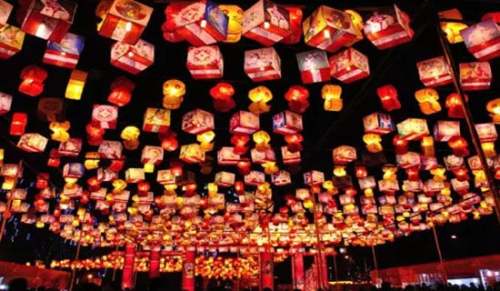- 相关推荐
对外介绍中国传统习俗:拜年
导语:拜年是中国民间的传统习俗,是人们辞旧迎新、相互表达美好祝愿的一种方式。下面YJBYS小编对外讲解拜年,欢迎参考!

Bàinián shì zhōngguó mínjiān de chuántǒng xísú, shì rénmen cí jiù yíngxīn, xiānghù biǎodá měihǎo zhùyuàn de yī zhǒng fāngshì. Gǔ shí “bàinián” yī cí yuán yǒu de hányì shì wèi zhǎng zhě bàihè xīnnián, bāokuò xiàng zhǎng zhě kòutóu shīlǐ, zhùhè xīnnián rúyì, wènhòu shēnghuó ān hǎo děng nèiróng. Yù yǒu tóngbèi qīnyǒu, yě yào shīlǐ dàohè. Suízhe shídài de fǎ zhǎn, bàinián de xísú yì bùduàn zēngtiān xīn de nèiróng hé xíngshì. Chúle yánxí yǐwǎng de bàinián fāngshì wài, yòu xīngqǐle lǐyí diànbào bàinián, diànhuà bàinián, duǎnxìn bàinián, wǎngluò bàinián děng .
Bàinián de shíjiān yībān wèi chū yīzhì chū wǔ,guòle làyuè chū bā jiù zǒu qīn fǎng yǒu duō bèi shì wéi bài zǎonián, ér zhēngyuè chū wǔ yǐhòu, shíwǔ zhīqián zǒu qīn fǎng yǒu wèi bài wǎnnián . Zǎonián hé wǎnnián dōu shǔ bìmiǎn yíhàn de yìngjí huò bǔjiù xìngzhì, mínjiān yǒu yànyǔ: Yǒuxīn bàinián shíwǔ bù wǎn
拜年是中国民间的传统习俗,是人们辞旧迎新、相互表达美好祝愿的一种方式。古时“拜年”一词原有的含义是为长者拜贺新年,包括向长者叩头施礼、祝贺新年如意、问候生活安好等内容。遇有同辈亲友,也要施礼道贺。随着时代的发展,拜年的习俗亦不断增添新的内容和形式。除了沿袭以往的拜年方式外,又兴起了礼仪电报拜年、电话拜年、短信拜年、网络拜年等 。
拜年的时间一般为初一至初五,过了腊月初八就走亲访友多被视为拜早年,而正月初五以后、十五之前走亲访友为拜晚年 。早年和晚年都属避免遗憾的应急或补救性质,民间有谚语:有心拜年十五不晚
New Year is the traditional folk customs of Chinese people, is a way to express good wishes and express good wishes. The original meaning of the word "New Year" is to worship the New Year for the elderly, including kowtowing to the elders, congratulating the New Year wishful greetings and greetings and so on. In case of peer friends and relatives, but also to salute congratulations. With the development of the times, New Year's customs also continue to add new content and form. In addition to follow the previous way of New Year, but also the rise of ritual telegram New Year, New Year by phone, New Year's greetings, New Year's greetings, etc. [1].
New Year's time is generally the first day to the fifth day, after the eighth day of the twelfth lunar month to visit relatives and friends are mostly seen as the early years, and the fifth day after the first month, fifteen before visiting relatives and friends for worship later years [2]. Early and old age are to avoid the regret of the nature of the emergency or remedial, folk proverbs:
tiē chūn lián
贴春联
Post a spring couplet. On the eve of the Spring Festival, every household will post on their door a spring couplet written on red paper creating a happy and prosperous environment for the Festival. In the past, the Chinese often wrote their own spring couplet with a brush or asked others to doit it for them; nowadays it is common for people to buy a printed spring couplet in the market.
fàng biān pào
放鞭炮
Set off firecrackers. Lighting firecrackers, which is meant to bid farewell to the old year and usher in the new, is a very important activity during the Spring Festival.
nián yè fàn
年夜饭
Chinese New Year's Eve dinner
yā suì qián
压岁钱
Money given to children as a lunar New Year gift for good luck; gift money; lucky money
guò nián
过年
Celebrate the Chinese New Year or Spring Festival
chú xī
除夕
Chinese New Year's Eve, which is on December 31, and on the final day of the lunar year which is the day before Chinese New Year's Day.
shŏu suì
守岁
Stay up late on Chinese New Year's Eve
bài nián
拜年
Pay a New Year call; pay a New Year's visit and give New Year's greetings
【对外介绍中国传统习俗:拜年】相关文章:
对外介绍中国汉语10-16
对外介绍中国成语:兔死狗烹05-28
对外介绍中国成语的由来:害群之马07-27
对外介绍中国流行词汇:土豪10-20
对外介绍中国成语的由来:对牛弹琴10-02
精卫填海中国神话对外介绍08-07
中国成语相敬如宾对外介绍08-18
对外讲解中国成语:投鼠忌器10-16
对外汉语中国成语典故介绍:惊弓之鸟09-16
对外解析中国成语:画蛇添足10-03